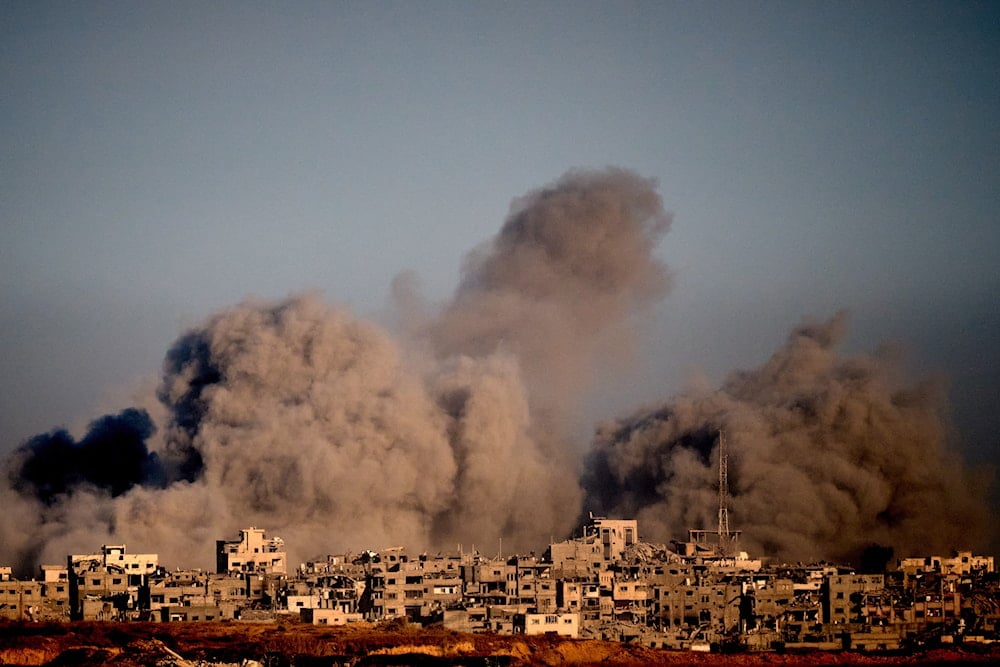Trump’s Gaza plan met with deep doubt by Palestinian Americans
As Republican lawmakers celebrate Trump’s proposed Gaza deal, Palestinian American voices caution against framing the agreement as "peace".
-

Smoke rises following an Israeli airstrike in the northern Gaza Strip, seen from southern occupied Palestine, Wednesday, Oct. 8, 2025 (AP)
Republican lawmakers rallied behind US President Donald Trump on Wednesday, praising the US president for brokering what he described as a “first phase” agreement between "Israel" and Hamas aimed at halting the war on Gaza and securing the release of remaining Israeli captives.
In Ohio, Senator Bernie Moreno, who in June introduced a resolution calling for Trump to receive the Nobel Peace Prize for his strike on Iran’s nuclear facilities, hailed the announcement as a “historic" day “for the United States, Israel, and peace in the Middle East.”
"An incredible feat that will go down in history. NOBEL PEACE PRIZE!” Moreno declared. On his part, Representative Brian Mast of Florida, a former US Army veteran who participated in previous Israeli wars on Gaza and wore his old IOF uniform to work after October 7, also applauded Trump’s role.
“President Trump just did what career diplomats never could, he brought the world closer than it’s ever been to peace in Gaza,” Mast, who chairs the House foreign affairs committee, wrote.
Details of proposed agreement remained murky
While US lawmakers avoided mention of Palestinian suffering, details of the proposed agreement remained murky. A senior Qatari official said on social media that the deal includes provisions for the release of Palestinian prisoners and the entry of humanitarian aid into Gaza.
Among Palestinians, however, skepticism prevailed. Mosab Abu Toha, a Gaza-born poet and 2025 Pulitzer Prize winner for his New Yorker essays about life under siege, voiced unease from his home in Syracuse, New York.
“Trump officially announces that Hamas and Israel signed off the first phase of ‘Peace Plan.’ To be honest, I do not like the language here,” he wrote. “The agreement signed should be emphatically about a permanent ceasefire. No more slaughtering of more Palestinians. It must not take phases to end a genocide. This is not truly anything close to peace! To me, it sounds like a pause of bloodshed for a few days or weeks!” Abu Toha added, “I’m old enough to remember the first phase of the previous ‘ceasefire deal’ in January this year.”
Similar caution was expressed by Yousef Munayyer, a Palestinian American who heads the Palestine/"Israel" program at the Arab Center, Washington, DC. “Very likely scenario moving forward,” he wrote on X. “1 Trump gets his Nobel Friday 2 Israel gets its captives back Saturday 3 Genocide continues Sunday.”
Very likely scenario moving forward:
— Yousef Munayyer (@YousefMunayyer) October 8, 2025
1. Trump gets his Nobel Friday
2. Israel gets it's captives back Saturday
3. Genocide continues Sunday
Peacemakers don't enable war crimes
Shibley Telhami, the Anwar Sadat professor for peace and development at the University of Maryland, dismissed suggestions that Trump deserves a Nobel Prize for the effort. The deal “would be very welcome, especially if it includes full ceasefire and flood of badly needed Gaza aid,” Telhami wrote.
“But so much remains unclear, even about first phase, including point of Israeli withdrawal. Key will be measures agreed to assure that first phase doesn’t become last phase,” he stressed.
“While ending carnage is badly needed, keep in mind: Gaza is obliterated, 10% of its population killed or wounded, possibly more, with overwhelming majority rendered homeless. Could take decades just to build what has been destroyed – and that’s assuming killing has really ended,” added Telhami, who was born into a Palestinian Christian family near Haifa.
He continued, “Agreement is welcome, but ‘peacemakers’ don’t enable war crimes, including the killing of thousands of children, for most of a year, then expect Nobel prize when a ceasefire is finally achieved. Italy’s PM has been referred to the ICC for much lesser enablement of war crimes.”

 4 Min Read
4 Min Read










